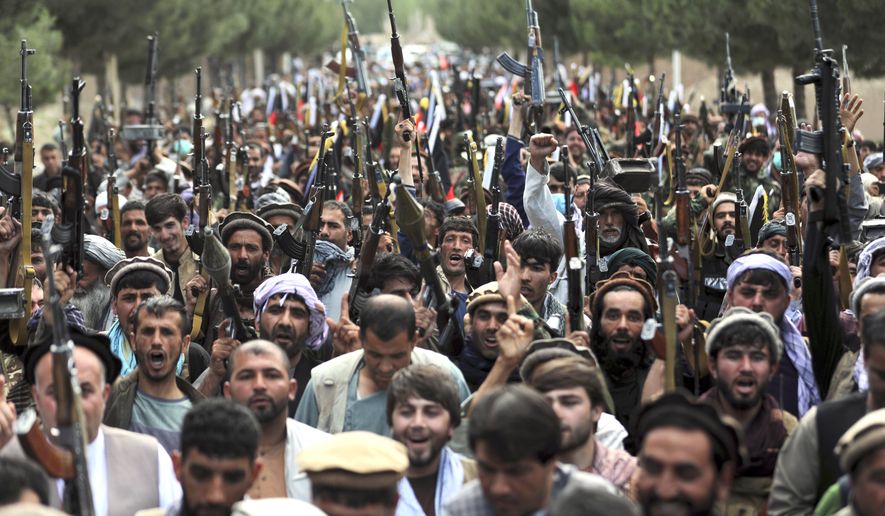OPINION:
Fifteen years ago, the Family Research Council advocated for Abdul Rahman, an Afghan Muslim man who had converted to Christianity and was being persecuted. Even in the face of a new Constitution, supported by the U.S. and purported to protect religious freedom, the Islamist headwinds blew strongly enough that Rahman’s safety was only ensured by the intervention of the international community, who at the time had been helping to rebuild Afghanistan. At that time, we had critiqued the Bush administration for failing to stand up for people like Mr. Rahman and called for pressure on the U.S.-backed Afghan government to ensure his protection. Eventually, Mr. Rahman was shuttled to Italy, not without much effort by his international defenders (he certainly lacked them within his own country).
Fast forward a decade and a half to the events of this week. If Christians were in danger previously (and they have been—Open Doors USA ranks Afghanistan the second-toughest place to be a Christian worldwide), things just got even worse. According to SAT-7 ministry President Dr. Rex Rogers, “[w]e’re hearing from reliable sources that the Taliban demand people’s phones, and if they find a downloaded Bible on your device, they will kill you immediately … . It’s incredibly dangerous right now for Afghans to have anything Christian on their phones. The Taliban have spies and informants everywhere.” SAT-7 also reports that Taliban are “pulling people off public transport and killing them on the spot if they’re Christians or considered ethnically ‘unpure.’”
The Taliban is also supposedly going house-to-house enforcing Islamic law and targeting a hit list of Christians, who understandably are in a fright. In many cases, their true identity as believers isn’t known, and others are fleeing. One Catholic family is appealing to the Pope for help. The Taliban’s worldview has zero-tolerance for religious freedom and especially Muslim converts to Christianity. This is to say nothing of the impact on other religious minorities, including Sikhs and Shia Muslims. While the situation for religious freedom in Afghanistan was never good, any hope of religious and political freedom has now been dashed by the poorly executed U.S. pullout of Afghanistan. The plight of Christians and other religious minorities in Afghanistan is dire.
Religious freedom (the ability to hold, choose, change, and live out one’s religious beliefs as protected by civil authorities) is a foreign concept to the radical Islamist rule imposed by the Taliban. Their worldview is dominated by sharia law, and that concept is at odds with religious freedom as those in the West understand it. They can’t permit it to exist—and the result is that people of non-conforming faith or no faith at all will suffer.
There are three possibilities, according to Help the Persecuted President Joshua Youssef, for Afghan Christians going forward: (1) recant and return to the Muslim background they converted from; (2) be forced to pay the penalty (in the form of a “tax” allowing them to remain a Christian, or dhimmi, under Islamic rule); or (3) be hunted down and killed by the Taliban. Any of these are tragic for religious freedom.
The negative developments of this week won’t be contained to Afghanistan; they will have ripple effects worldwide. In the wake of this display of U.S. weakness, China is now even more greedily eyeing and ready to take Taiwan. Russia will now be more emboldened to move into Ukraine. The shadow of oppression will grow long around the globe as these authoritarian regimes expand, imposing their ideas to squash freedom abroad while continuing to stifle it at home.
On top of this are other future consequences of an increasingly weak, impotent United States on the world stage. The reputational harm from all this cannot yet be assessed. Who will trust us now when we tell them we will stand by their side? Who really believes we are ready to invest—and defend—freedom around the world now?
As much as the Biden administration has rolled back religious freedom in its international playbook, the United States is still the primary defender of that right, and other human rights, on the world stage. Yet, our actions this past week have relegated us more to the shadows – and the defense of religious freedom and human rights along with it. It is a sad day for the United States and a sad day for religious freedom.
• Tony Perkins is President of Family Research Council, a Commissioner on the U.S. Commission on International Religious Freedom, and a Marine Corps veteran. Travis Weber is Vice President for Policy and Government Affairs and Director of the Center for Religious Liberty at Family Research Council and served in the Navy after graduating from the U.S. Naval Academy.




Please read our comment policy before commenting.